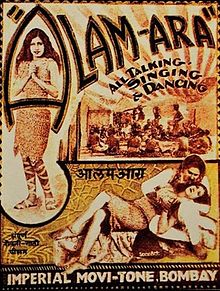
Back আলম আৰা (১৯৩১ চলচ্চিত্ৰ) Assamese আলম আরা Bengali/Bangla Alam Ara German Alam Ara Spanish عالمآرا (فیلم) Persian Alam Ara Finnish Alam Ara French आलमआरा (1931 फ़िल्म) Hindi Alam Ara HIF Alam Ara ID
| Alam Ara | |
|---|---|
 Theatrical release poster | |
| Directed by | Ardeshir Irani |
| Screenplay by | Ardeshir Irani |
| Based on | Alam Ara by Joseph David |
| Produced by | Ardeshir Irani |
| Starring | |
| Cinematography | Adi M. Irani |
| Edited by | Ezra Mir |
| Music by |
|
Production company | Imperial Film Company |
| Distributed by | Sagar Movietone |
Release date |
|
Running time | 124 minutes[1] |
| Country | British India |
| Language | Hindustani |
| Budget | ₹40,000[2] |
Alam Ara (transl. Ornament of the World) is a 1931 Indian Hindustani-language historical fantasy film directed and produced by Ardeshir Irani. It revolves around a king and his two wives, Navbahaar and Dilbahaar, who are childless; soon, a fakir (Muhammad Wazir Khan) tells the king that the former wife will give birth to a boy, later named Qamar (Master Vithal), but the child will die following his 18th birthday if Navbahaar cannot find the necklace he asks for. Meanwhile, the king finds out that Dilbahaar falls for the senapati Adil (Prithviraj Kapoor), leading the king to arrest him and evicts his pregnant wife, who later gives birth to Alam Ara (Zubeida).
Irani was inspired to make Alam Ara after watching the 1929 American part-talkie Show Boat. The story was adapted from the Bombay-based dramatist Joseph David's play of the same name. Made on a budget of ₹40,000 (equivalent to ₹12 million or US$150,000 in 2023), principal photography was handled by Adi M. Irani within four months in Bombay. Because the studio was located near a railway track, it was filmed mostly during the nighttime to avoid noise from the active trains. Following filming, Ardeshir Irani finished the sound recording using the single-system recording. Firozshah Mistry and B. Irani served as the music directors.
Alam Ara was released on 14 March 1931 and performed well at the box office. Critics were appreciative, with the performance and songs getting the most attention, though some of whom criticised the sound recording. In addition to the successes, the film was also widely considered a major breakthrough for the Indian film industry and Ardeshir Irani's career with its status as the country's first sound film. Although no print or gramophone record of the film is known to survive, making it a lost film, surviving artefacts include its stills and posters. In 2017, the British Film Institute declared it as the most important of any lost films produced in India.
- ^ Pradeep 2006.
- ^ Garga 1980, p. 12.
© MMXXIII Rich X Search. We shall prevail. All rights reserved. Rich X Search